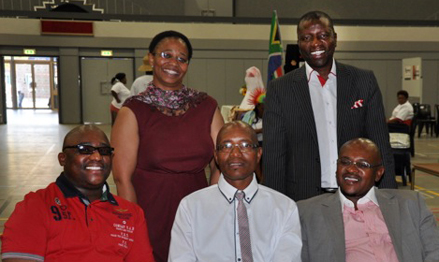|
 |
At the Community Engagement Open Day were, at the back, from the left: Dr Choice Makhetha, Vice-Rector: External Relations; and Rev Billyboy Ramahlele, Director of Community Engagement. In front are, from the left: Selby Lengoabala, Betlehem Unit Manager; Councillor Job Tshabalala, Acting Executive Mayor; and Councillor Isaac Tshabalala, Strategic Manager in the office of the Executive Mayor of the Dihlabeng Local Municipality.
18 October 2013 |
The university held its first Community Engagement Open Day in order to honour outstanding individuals and highlight programmes that advance its civil responsibility. Hosted by the UFS Community Engagement Directorate, local community members, students and staff gathered in the Callie Human Centre at the Bloemfontein Campus, displaying what they do to empower communities.
Partners in Community Engagement (CE) and Service Learning (SL), local government, community-based research, student volunteer groups, Non-Profit Organisations (NPOs) and private business interacted with guests at their various information stalls. Faculties and departments displayed their distinctive programmes and demonstrated a renewed commitment to change lives through sharing knowledge, rendering services and fostering empowerment among communities.
In recognition of outstanding service, commitment and excellence in the field of community engagement and service learning, some staff members, researchers and some partners received the Vice-Rector’s Award for Community Engagement. Among them was Prof Matie Hoffman, who was honoured for his longstanding involvement in research at the Boyden Observatory. He is currently at the forefront of renovations for the planetarium at Naval Hill. In the category for external partners, REACH and Heidedal Childcare were awarded for demonstrating commitment towards their partnership with the university. The acting Executive Mayor, Job Tshabalala, also received an award on behalf of Dihlabeng Local Municipality Mayor, Tjhetane Mofokeng, for their involvement in education and social cohesion programmes. During his keynote address, the Director of Community Engagement, Rev Billyboy Ramahlele, emphasised the contribution that community engagement has on the two major strategic programmes of the university, namely the Academic and Human Projects. He pointed out that CE creates a platform on which students learn to appreciate human diversity in a real and unprotected set-up.
The interactions of the Open Day are expected to raise awareness, cultivate understanding among partners, encourage solid alliances and bring to the fore an acknowledgement of community engagement as the integral part of higher education.